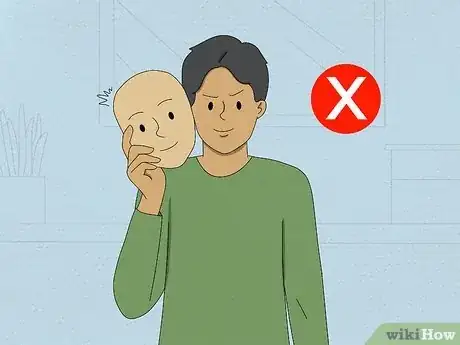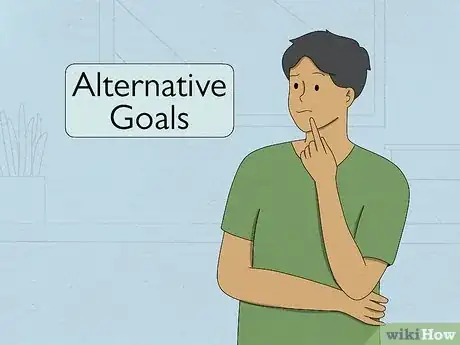This article was co-authored by Annie Lin, MBA. Annie Lin is the founder of New York Life Coaching, a life and career coaching service based in Manhattan. Her holistic approach, combining elements from both Eastern and Western wisdom traditions, has made her a highly sought-after personal coach. Annie’s work has been featured in Elle Magazine, NBC News, New York Magazine, and BBC World News. She holds an MBA degree from Oxford Brookes University. Annie is also the founder of the New York Life Coaching Institute which offers a comprehensive life coach certification program. Learn more: https://newyorklifecoaching.com
This article has been viewed 71,448 times.
Learning to wait to get what you want in life can be hard. You don’t always know whether your wish is around the corner or a long way to come. Life can be unpredictable, and it’s tough to live with unpredictability when you’re told that things happen if you make them happen. Of course, it doesn’t really work that way. What you want is not always clear, the future often is beyond our control, and time doesn’t always yield to our expectations. However, being clear about your goals, patience and perseverance can help you turn time to your best advantage.
Steps
Knowing What You Want and How to Get It
-
1Find out what it is that you want. This could be anything. Whether you wish to get a job, find love or friendship, make the trip of your life or simply buy a new camera, you need to make sure you know exactly what you want and why you want it.[1]
- Although it may sound easy, this is in in fact the most difficult task. You may not be clear about your goals or conflicted between two options. Be honest with yourself and find out what you really enjoy or can help you become the person you want to be.
- If you’re undecided between several options, evaluate the strengths and weaknesses of each and make a decision based on it. You can write down a list of pros and cons to help you through the process.
- Focus on the reasons behind your wish, consider possible alternatives, compare them and see whether your original wish is the one that best responds to your larger goal. For example, if you want to get a special camera in order to become a professional photographer, consider other cameras in the same range and check whether the one you originally wanted is still the best option to help you achieve your larger goal: becoming a professional photographer.
-
2Think S.M.A.R.T. This is a common strategy in project management, but it also works effectively in personal development. It will allow you to stay grounded, think in practical terms and steer clear of wishful thinking. S.M.A.R.T. is an acronym of five basic criteria that can help you set clear goals. What you want should be:
- Specific. Don’t be generic about your goals. Ask yourself what you really want, why you want it, who can help you get it and in which way.
- Measurable. Sticking to quantifiable goals can also help you be specific and grounded. For example, if you want a car, find out its price, make an estimate of how much it will take for you to have that amount of money, think of where you’ll store it.
- Achievable. Be realistic about your goals. If you want to become a millionaire or marry a princess, the odds could be against you. Stick to goals that you know are within your reach.
- Relevant. Ask yourself whether what you want can make a difference to other people besides you. If your achievement is also in their best interest, they’ll help you get it.
- Time-bound. Make an estimate of how long it can take for you to reach your goal and set smaller goals on your path. For example, if you want to become an actor, you can give yourself two years to get an audition, three years to have a speaking role and five years to achieve the final goal before moving on to something else. [2]
Advertisement -
3Try your best to achieve what you want. Consider all possible ways to achieve your goal, choose the one that works best for you and pursue it. Remember there are many ways to get to the same place: what worked for others might not work for you and vice versa.
- For example, if you want to become a journalist, find out which schools can prepare you for the job and make an objective cost-benefit analysis. Consider doing part-time jobs and volunteer work that can help you get further experience in the field. Meet with people who work in the sector and ask for their advice.
-
4Don’t cheat. Impatience could lead you to think that the reason why you’re not getting something is that you’re not slick enough. However, keep in mind that honesty ultimately pays off. Frauds might get what they want faster, but they might also lose it overnight.
- For example, you might get the date of your life by overstating your skills and achievements or pretending to be someone else. If you keep dating this person, though, it will take them little time to know you as you really are.
Learning to Wait
-
1Learn to cooperate with time. When the wait becomes unbearable, time can feel like an enemy. However, it is the best resource you have to make the wait worthwhile: manage it wisely and invest it in fruitful activities that can help you reach your goal. [3]
- Although we have no control over the passing of time, we can organize it. Sticking to a timetable, making short-term plans and setting deadlines can help you manage your time and turn it into your ally.
- Not all of your time should be devoted to reaching your goal. Wise time management also calls for taking breaks. If you don’t allow yourself some leisure time, you could become frustrated or drain all your energy for no reason.
-
2Be patient. Patience is an art that takes skills and practice. It means realizing that time is unpredictable and we don’t get what we want when we want it, as well as coming to terms with the fact that some things can be changed while others can’t.[4]
- Impatience stems from a feeling of impotence, of not being able to change the way things are. Realizing that there are things you can act upon and that the direction that your life takes is first of all determined by your decisions is important to have a more active approach and feel you're still in the driver’s seat.
- For example, in order to find a job as a journalist you might send out thousands of resumes without much luck. However, focusing on other things you can do to achieve your goal, like writing as a volunteer for your college bulletin or attending workshops, can turn your wait into a time actively invested in useful activities and make it more tolerable.
- Devoting some time during the week to physical exercise and relaxation techniques can help you release stress and increase your level of patience.
-
3Realize it’s okay to be still sometimes. Not making progress can have its benefits. It is natural for some periods of time to be devoted to rest instead of activity. Recharging you batteries is necessary to get back in full shape. [5]
- Just like how we get what we want can be unpredictable, inactivity does not always happen according to our plans. For example, if you suddenly find yourself unemployed, don’t see this period as a waste of time or feel guilty about it. You can make it useful by pursuing what you really want to do and enjoying the benefits of having more time to yourself.
-
4Be thankful for what you already have. You might think that, if you’re not getting what you want, all is wrong with your life. Thinking of all you have already accomplished will put things into perspective and make you realize your life has gone down unpredictable paths before. What you now take for granted was also achieved through patience and perseverance.[6]
- You can keep a gratitude journal where you actively list the things and reasons you should be grateful for.[7]
-
5Keep yourself busy. Make sure you always have something to look forward to. Whether it be doing some cleaning or spending a night out with friends, some distraction will make the wait more tolerable. Getting fixated about your goal won’t help you get it: it will take a toll on your energy and health.
- Keep in mind that, as much as it is important, distraction shouldn’t be obsessive-compulsive. Spending half a day each day mopping the floor in order to forget you don’t have the job of your life will just as well affect your energy and health.
-
6Stay optimistic. Having a positive outlook on life will also boost your patience. Optimism is an extremely good fuel: being energetic and proactive will also help you get what you want faster. [8]
- Even in this case, thinking back on your past achievements and appreciating what you already have is a good way to look on the bright side of the wait.
Re-evaluating What You Want
-
1Understand why things are not going according to your plan and fix it. Not getting what you want should also be a trigger that perhaps your goal is achievable, but there might be something wrong with your method. Be honest with yourself and think objectively of whether there is something you could do that you haven’t done yet.
- Thinking about the whole process and retracing your steps from the beginning can help you see what mistakes you might have made, and which alternative paths you could have taken. [9]
-
2Explore alternative ways to get there. You should be prepared to reconsider your strategies and change your course of action. Sometimes you can become fixated with a particular way to get what you want and fail to see this is not producing the expected results. Being flexible and objective will help you achieve your goals faster and remember that what is really important is the final objective, rather than how you achieve it. [10]
- For example, if spending 16 hours a day sending resumes hasn’t helped you find a job, perhaps there’s some better way to invest your time, like networking.
-
3Think about why you really want what you want. When you’ve been waiting for a long time, it’s always good to think back on why you wanted what you want in the first place. Sometimes you might want something so hard that the energy you’ve put into wanting it made you lose track of your larger goals.
- Ask yourself whether getting what you want has become a matter of principle. If this is the case, you should reconsider your ambitions and focus on the reasons behind them rather than the object itself.
-
4Consider alternative goals. Perhaps not getting what you want is a sign that this is out of your reach. Although it may be difficult to re-evaluate your ambitions, desiring something you’ll never get will only make you frustrated and ultimately dissatisfied with yourself.
- This doesn’t mean you should revolutionize your life. For example, even if the job of your life is impossible for you to get, there might be other jobs that are close enough and just as rewarding.
-
5Realize that happiness isn't the same as getting what you want. You might think happiness is a measurable asset like wealth or fame: the more money you have, the richer you are, the more people know you, the more famous you are. However, happiness is more a matter of attitude than quantity or possession. Instead, unhappiness and dissatisfaction work in a loop: no matter how much you get, it’ll never be enough. [11]
- Think back on what made you happy before. Did happiness coincide with getting what you wanted, or was it a result of your approach to what you had? Can happiness be objectified, or is it more of a methodology?
Expert Q&A
-
QuestionHow do you make yourself wait?
 Annie Lin, MBAAnnie Lin is the founder of New York Life Coaching, a life and career coaching service based in Manhattan. Her holistic approach, combining elements from both Eastern and Western wisdom traditions, has made her a highly sought-after personal coach. Annie’s work has been featured in Elle Magazine, NBC News, New York Magazine, and BBC World News. She holds an MBA degree from Oxford Brookes University. Annie is also the founder of the New York Life Coaching Institute which offers a comprehensive life coach certification program. Learn more: https://newyorklifecoaching.com
Annie Lin, MBAAnnie Lin is the founder of New York Life Coaching, a life and career coaching service based in Manhattan. Her holistic approach, combining elements from both Eastern and Western wisdom traditions, has made her a highly sought-after personal coach. Annie’s work has been featured in Elle Magazine, NBC News, New York Magazine, and BBC World News. She holds an MBA degree from Oxford Brookes University. Annie is also the founder of the New York Life Coaching Institute which offers a comprehensive life coach certification program. Learn more: https://newyorklifecoaching.com
Life & Career Coach Stay open to what is unfolding in this moment. Slow down your breathing to activate the para-sympathetic nervous system and relax. Stay grounded by feeling your feet on the ground and let your anxious thoughts drop back down and rest in the body. If this is hard for you, start meditating to become more aware of your emotions. The more you can process in the moment, the easier it will be to wait.
Stay open to what is unfolding in this moment. Slow down your breathing to activate the para-sympathetic nervous system and relax. Stay grounded by feeling your feet on the ground and let your anxious thoughts drop back down and rest in the body. If this is hard for you, start meditating to become more aware of your emotions. The more you can process in the moment, the easier it will be to wait.
Warnings
- Consider the whole aspects of what you want. If you want fame, you should also be prepared to deal with relinquishing some of your privacy, dealing with other people’s judgments and knowing you could lose it any minute.⧼thumbs_response⧽
References
- ↑ Annie Lin, MBA. Life & Career Coach. Expert Interview. 25 November 2019.
- ↑ http://www.yourcoach.be/en/coaching-tools/smart-goal-setting.php
- ↑ http://www.huffingtonpost.com/dr-carmen-harra/success-and-motivation_b_4146899.html
- ↑ Annie Lin, MBA. Life & Career Coach. Expert Interview. 25 November 2019.
- ↑ http://www.huffingtonpost.com/dr-carmen-harra/success-and-motivation_b_4146899.html
- ↑ Annie Lin, MBA. Life & Career Coach. Expert Interview. 25 November 2019.
- ↑ http://greatergood.berkeley.edu/article/item/tips_for_keeping_a_gratitude_journal
- ↑ https://experiencelife.com/article/worth-the-wait/
- ↑ http://www.huffingtonpost.com/dr-carmen-harra/success-and-motivation_b_4146899.html












































































Medical Disclaimer
The content of this article is not intended to be a substitute for professional medical advice, examination, diagnosis, or treatment. You should always contact your doctor or other qualified healthcare professional before starting, changing, or stopping any kind of health treatment.
Read More...